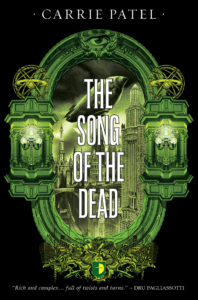Writing is inherently frustrating, because it’s a process of condensing imagination into prose”“taking countless colours and dimensions of dreaming and stripping them down to a few crude black and white stick drawings that readers can expand back in their own imagination. It’s like using an asterisk to describe a snowflake”“all you can hope to get across is the basic idea, and the hope that the audience will see something beautiful, even if it’s not exactly what you saw.
I’ve long been interested in the how this works”“not the practicalities of construction and grammar (though those are important)”“but the mental mechanics of winnowing down world into story and back again. As many writers do, I’ve tried a few tricks to get at this”“for example, telling the same story at different lengths while still keeping it interesting, or telling a story entirely in the aftermath of key scenes. When I became an editor, though, it occurred to me that I had an opportunity to study the process more broadly empirically.
The result, thanks to the hard work and goodwill of several dozen authors, is what I’ve now grouped under the imprint Verdage”“books that are, first and foremost, anthologies of great SFF, but that also look at the writing process. The first in the series was Reading 5X5, in which five groups of five authors each approached the same theme, to see how different authors work with the same material. The second, Score: an sff symphony, asked twenty authors to write stories from a common emotional score, so that while the concepts and settings are all over the place, each story evokes specific emotions on a path to goes from joy to despair and back to hope.
 The latest installment from Verdage, out 1 August 2020, is Reading 5X5 x2: Duets. For this anthology, I asked five talented authors: Douglas Anstruther, L’Erin Ogle, J. Tynan Burke, David Gallay, and Evan Marcroft, to co-write a story with each of the others, as well as a solo story. The substantive results are everything I expected”“stories of loss and passion, of abandoned alien spaceships, of cross-galaxy revenge, of demonic software and clockwork universes.
The latest installment from Verdage, out 1 August 2020, is Reading 5X5 x2: Duets. For this anthology, I asked five talented authors: Douglas Anstruther, L’Erin Ogle, J. Tynan Burke, David Gallay, and Evan Marcroft, to co-write a story with each of the others, as well as a solo story. The substantive results are everything I expected”“stories of loss and passion, of abandoned alien spaceships, of cross-galaxy revenge, of demonic software and clockwork universes.
Just as interesting, though, is the other purpose of the anthology”“looking at how authors’ voices change when they collaborate. Most of the authors hadn’t collaborated before, and each pair found its own mechanism for doing so”“all different, all effective”“chronicled in authors’ notes at the end of the book. Read any of the authors’ solo stories and compare that voice with how they sound writing with any of the others, and with how that second author sounds solo”“it’s a fascinating study in what makes an author’s voice what it is.
Writing is a careful process of culling and filtering decisions, using a (literally 🙂 ) limited alphabet to convey infinities of universe, emotion, and action. Doing that jointly with another person who pronounces all the letters a little differently can be a difficult process. But the resulting harmony of voices can not only have a unique beauty of its own, but can show us something new about how each of the voices sound on their own. I hope this anthology does that.
Reading 5X5 x2: Duets is out on 1 August 2020 from Verdage, an imprint of Metaphorosis Publishing.
Find out more at metaphorosis.com and on Twitter @Metaphorosis.
 BIO:Â B. Morris Allen grew up in a house full of books that traveled the world. Nowadays, they’re e-books, and lighter to carry, but they’re still multiplying. He’s been a biochemist, an activist, and a lawyer, and now works as a foreign aid consultant. When he’s not roaming foreign countries fighting corruption, he’s on the Oregon coast, chatting with seals. In the occasional free moment, he works on his own speculative stories of love and disaster.
BIO:Â B. Morris Allen grew up in a house full of books that traveled the world. Nowadays, they’re e-books, and lighter to carry, but they’re still multiplying. He’s been a biochemist, an activist, and a lawyer, and now works as a foreign aid consultant. When he’s not roaming foreign countries fighting corruption, he’s on the Oregon coast, chatting with seals. In the occasional free moment, he works on his own speculative stories of love and disaster.
Find out more at BMorrisAllen.com and on Twitter @BMorrisAllen.
If you’re an author or other fantasy and science fiction creative, and want to do a guest blog post, please check out the guest blog post guidelines. Or if you’re looking for community from other F&SF writers, sign up for the Rambo Academy for Wayward Writers Critclub!







 Growing up, two of my favorite things were books and video games. If you’d told me twenty years ago that I’d grow up to write both, I probably would have choked on my Mountain Dew.
Growing up, two of my favorite things were books and video games. If you’d told me twenty years ago that I’d grow up to write both, I probably would have choked on my Mountain Dew.